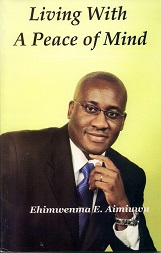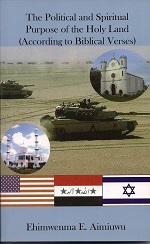 |
|
My enforced sojourn in the United States over the
past four, five years, where the majority of our descendants in the Black Diaspora
will be found, has persuaded me that some deliberate, structured quality of
attention needs be paid to the apprehension of the mother continent by our scattered
kinfolk, one that may assist their leadership in defining what should be their
relationship with black leaders of our own world across the oceans. There is,
after all, a sound epochal excuse, though I hasten to add that a centennial
or millennial ending is a purely symbolic, and not even universal, notation.
Nonetheless, the sense of a passing era, no matter in what culture, rightly
nudges us towards a ritual of stocktaking. We draw a line across the last page,
but always -- I like to believe -- with an implicit or explicit intent that
a qualitative leap forward will thereby result from an objective assessment
of that closed page. It is perhaps useful to note that the first global effort
to bring together representatives of the black peoples of the world -- the Conference
of African and New World Intellectuals -- took place in 1900, in Manchester,
a meeting that united, for the first time, thinkers and artists from the continent,
from the Caribbean and the United States, one that is sometimes even counted
as the pioneer pan-African conference.
At that conference, as at subsequent ones, attempts
were made to map the future of the Black world, to make an inventory of its
resources, determine its place in an uncertain universe, and examine such issues
as the consequences of slavery, Western imperialism and colonialism, the possible
repatriation of Africans to their homeland etc., etc. One theme that began to
surface with increasing frequency during these encounters was, of course, the
nature of the relationship between the children of the Diaspora and the African
continent. It is a pity that this theme has not been pursued in any pragmatic
way, in a manner that would leave a massive impact on the current products of
the slave experience, especially its leadership.
The frequent interventions by some vocal African
American leadership in the fortunes of the African continent have not
always been informed by Memory in their attention to issues of power and liberty within independent
African nations. Let two quick examples illustrate: one, the obsessed
advocacy of a former Civil Rights leader on behalf of the mass murderer Field
Marshal Idi Amin, a career that was lucratively carried forward into service
on behalf of the late deceased dictator of Nigeria, Sanni Abacha. And the second:
in 1990, when Abacha's predecessor, Ibrahim Babangida, showed signs of digging
his heels in office, the Nigerian people were bewildered to hear the voice of
yet another Civil Rights leader berating President Clinton for failing to invite
that dictator on a state visit to the United States. The Civil Rights leader
heaped the most extravagant encomiums on Babangida - "the most visionary leader
of the greatest nation the continent had produced," etc., etc. He went to battle
on behalf of the black race: "it was a disgraceful omission and an insult to
the African continent," he declared, "a humiliation also to the African American
peoples in the United States, that this giant of a leader had been shunned by
the U.S. government" -- all this at a time when the Nigerian people were locked
in a deadly struggle with a thoroughly discredited dictator, demanding that
he fulfill his pledge to quit office, and turn over the reins of government
to the people's elected representatives. (And by the way, is the American media
- mainstream or alternative - educating its people through a transmission of
the ongoing public post-mortem on Sanni Abacha's reign of terror?) |
|
The Political & Spiritual Purpose of the
Holy Land
 |
| |
|
These memories are not evoked in any spirit of
recrimination; they are in any case balanced by the staunch dedication of yet
other African American leaders to the cause of their oppressed brothers and
sisters on the African continent. It is clear however, that oceans of ignorance
still separate the general black population from the mother continent, generating
confusion and/or easy manipulation by opportunistic but influential leadership,
especially among an impressionable generation, even within citadels of learning.
I have therefore grown increasingly convinced that a percussive impact is required,
a mammoth-scale, extended event that celebrates and contextualizes both the
African past and contemporary reality. Hopefully, such a feast of encounters
will enable the followership to evaluate and respond to the positions of their
own leaders on this side of the Atlantic wherever there is a contest between
the forces of repression and those of freedom.
There is a need for a dramatic assault on the assumptions
of the African American - and I speak beyond politics now but also of culture
- an exposure to alternative life styles and values, community models that exist
elsewhere and make a visitor to the United States shudder with horror at the
debasement of humanity in American society. Only a minority of our descendants
here are equipped with an alternative cultural reality that can make them withstand
the depredations of a soulless, consumerist society that begins by consuming
its children and warps their humanity for life. And so my mind envisages a huge
concourse here - not now on the African continent, like the former Black Arts
Festivals - but right on the soil of the United States, the combination of an
Expo and Indaba that would last six months, even a year, one that involves symposia,
exhibitions, dioramas, the performance arts, cinema, etc., and of course, would
serve as a marketplace of information and ideas. Such an Expo must of course
also have its own Chamber of Horrors - Ancient and Contemporary - side by side
with its Halls of Heroes.

Nigeria: Black Gate
This has been, for us, a near half-century of,
in the main, a blundering relationship - that is, the half-century since the
commencement of independence for many new nations - blunders of perception and
blunders of acts, pronouncements and interaction. It is time that an enriched
awareness, a truthful, palpable knowledge of the distanced other and kin, be
promoted both graphically and intellectually, within a dynamic arena where the
authentic voices of our peoples, and their principled interpreters, the manifestations
of their creative existence and world view are projected in a celebratory yet
reflective context. I can think of worse ways of closing the chapter on a new
millennium - or indeed any phase of collective epochal consciousness - or of
ushering in a new one. Even if such an encounter does not reach into the formative
interior of the majority, it will be an eye-opener and a mind-expander for several,
including even the receptive exceptions among a blundering white community.
At the very least, it would have provided a good party, a feast of the mind
- for those who seek it - and of the senses for others, hopefully both, the
granddaddy of all Indaba, ikore and Kwanzaa.
In 1986 Wole Soyinka was the first African writer
to receive the Nobel Prize for Literature. He is the recipient of numerous other
prestigious awards, including several honorary doctorates from universities
all over the world. Apart from his stature as a pioneer in African drama written
in English, Soyinka has produced a vast body of work as poet, dramatist, theater
director, novelist, essayist, autobiographer, political commentator, critic,
and theorist of art and culture. In addition to his Yoruba-Christian upbringing,
Soyinka received a Western academic education. Born Akinwande Oluwole Soyinka
in Abeokuta, Nigeria, he studied at the University College in Ibadan, Nigeria
and earned a B.A. degree from the University of Leeds in Great Britain.
Soyinka’s column, Olumo Eyrie, takes its name from
the rock hill in Abeokuta, his hometown, which served both as a refuge in times
of war, and as an observation post for the township's sentinel.
|
|
|
![]()